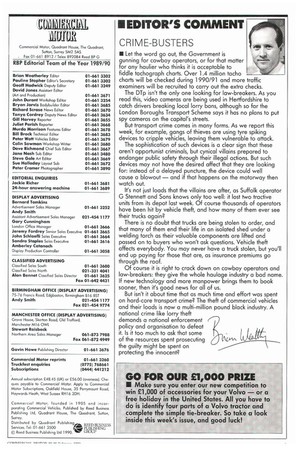CRIME-BUSTERS
Page 5

If you've noticed an error in this article please click here to report it so we can fix it.
• Let the word go out, the Government is gunning for cowboy operators, or for that matter for any haulier who thinks it is acceptable to fiddle tachograph charts. Over 1.4 million tacho charts will be checked during 1 990/9 1 and more traffic examiners will be recruited to carry out the extra checks.
The Dip isn't the only one looking for law-breakers. As you read this, video cameras are being used in Hertfordshire to catch drivers breaking local lorry bans, although so far the London Boroughs Transport Scheme says it has no plans to put spy cameras on the capital's streets.
But transport crime comes in many forms. As we report this week, for example, gangs of thieves are using tyre spiking devices to cripple vehicles, leaving them vulnerable to attack.
The sophistication of such devices is a clear sign that these aren't opportunist criminals, but cynical villains prepared to endanger public safety through their illegal actions. But such devices may not have the desired affect that they are looking for: instead of a delayed puncture, the device could well cause a blowout — and if that happens on the motorway then watch out.
It's not just loads that the villains are after, as Suffolk operator G Stennett and Sons knows only too well: it lost two tractive units from its depot last week. Of course thousands of operators have been hit by vehicle theft, and how many of them ever see their trucks again? There is no doubt that trucks are being stolen to order, and that many of them end their life in an isolated shed under a welding torch as their valuable components are lifted and passed on to buyers who won't ask questions. Vehicle theft affects everybody. You may never have a truck stolen, but you'll end up paying for those that are, as insurance premiums go through the roof. Of course it is right to crack down on cowboy operators and law-breakers: they give the whole haulage industry a bad name. If new technology and more manpower brings them to book sooner, then it's good news for all of us.
But isn't it about time that as much time and effort was spent on hard-core transport crime? The theft of commercial vehicles and their loads is now a multi-million pound black industry. A national crime like lorry theft demands a national enforcement policy and organisation to defeat it. Is it too much to ask that some of the resources spent prosecuting the guilty might be spent on protecting the innocent?
















































































































































































